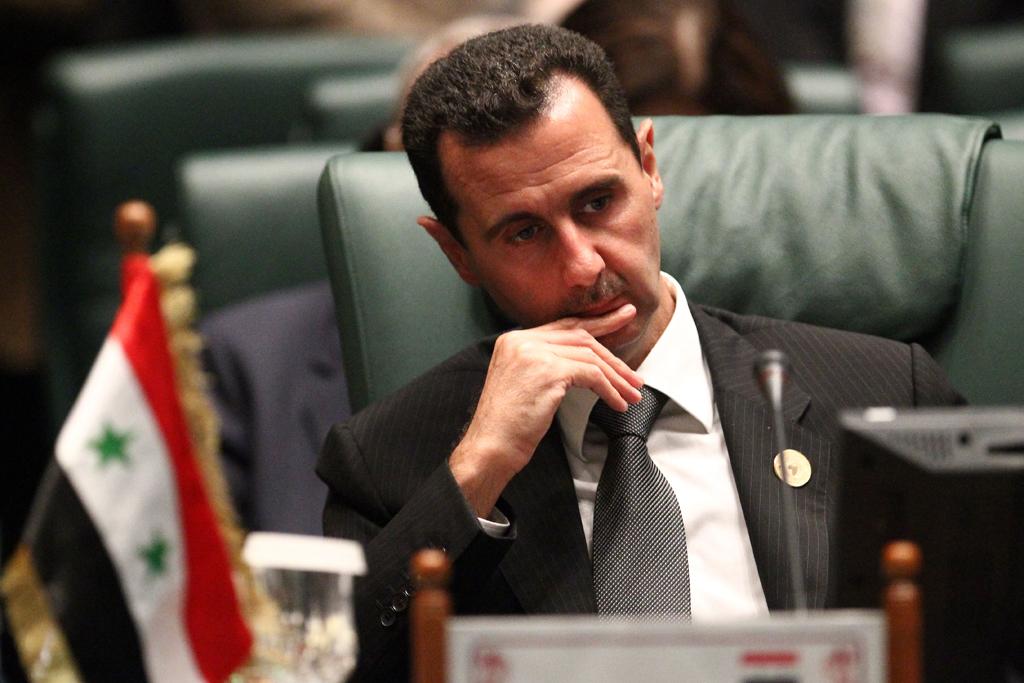Here’s a plan to end the conflict in Syria: support Assad
Syrian President Bashar al-Assad attends an Arab-African joint summit in the Libyan coastal city of Sirte in 2010.
There is a well-known maxim in American politics: a bad plan beats no plan.
That surely has been proven the case in Syria. As The New York Times reported Nov. 8 in a sobering piece by Anne Barnard, Syrians are increasingly reconciling themselves to their president, Bashar al-Assad.
That includes former and current members of armed opposition groups, many of whom have given up on the so-called democratic opposition and even the Free Syrian Army.
That is because neither they nor their external supporters, most especially the United States government, ever had an effective plan for removing the tenacious dictator.
Assad and his coven of supporters — Iran, Russia, Hezbollah and Iraqi Shia militias — did have a plan: employ all means, including the use of chemical weapons against non-combatants, to halt and eventually defeat those opposition elements most likely to receive the support of the United States and the Gulf Arab states.
No effective counter-plan and an inability to form a coherent and united opposition organization meant ceding the battlefield and the political space to either Assad or the extremist groups.
Chest-thumping proclamations of “Assad must go!” and “red lines” now sound like the hollow threats of a schoolyard bully wanna-be. Brutal dictators are not moved by words and very rarely by threats.
The bullies — Assad, Russia and Iran — called the administration and its supporters on their words. We responded with more vacuous words and indecision. Syria’s democratic opposition and Free Syrian Army tragically believed us. But Assad did not.
Nearly three years into their civil war, Syrians have no stomach now for seeing their country descend into a killing field for violent extremists hell-bent on tearing down a country and building an illusory Islamist state. It would be a state in which Syrians have no political or even personal freedom. It would be a throwback to a primitive Taliban-like existence. Better Assad; he’s the one they know.
So, if Syrians are prepared to cast their lot with the dictator of Damascus, what should the United States and its allies do? They are not without options. Assad wants, even needs, legitimacy, first from the Syrians but also from the international community. The United States can play an important role in ensuring that legitimacy carries conditions.
Here are some conditions the United States might consider.
First, Assad must agree to internationally assisted and monitored free and fair elections for both the presidency and the national assembly within a timeframe of two to three years. The extended time would enable Syria to prepare for elections and avoid the mistakes of Egypt and Libya.
Second, during the transition period, political parties would be free to organize and campaign. No party espousing violence or disenfranchisement of any ethnic, tribal or religious group would be eligible to participate in the country’s political process. Media and public interest groups would abide by comparable rules and enjoy freedom of expression and a voice in the process.
Third, Assad could not run for president. He would be eligible to seek the office again after an agreed-upon period of, say, 10 years. He should be encouraged to retire.
Fourth, prior to the elections, Syrians would vote for representatives to a constitutional assembly that would draft a new constitution for approval by Syrians in a national referendum.
Fifth, Syrian jurists, selected with international approval, would hear and judge cases of criminal behavior both by members of the current Assad government and opposition groups. No Syrian convicted of crimes of violence would be eligible to serve in a future Syrian government.
Sixth, the Syrian army and police would continue but under new leadership. The current “mukhabarat,” or military and internal security, would be disbanded. Military officers accused of serious crimes would be removed to await trial before Syrian jurists. The international community would vet the new army leadership. The army and police would turn their full attention to restoring order, protecting the public and quelling violence between rival opposition groups.
Finally, as these actions are taken, the international community should consider removing sanctions. A UN Security Council resolution securing Assad’s pledge to abide by the conditions might be the leverage to confer the legitimacy that Assad so badly wants.
Living with Assad may be distasteful for the United States and others in the international community. But for the Syrian people, the hope of deposing Assad is an alternative that carries the certainty of horrifying violence, hunger, dislocation and endless suffering that they can no longer afford.
The United States and others in the international community must step up to bring an end to the Syrian civil war. Unlike our behavior since the civil war began, we now must back up our words with concerted and vigorous action. We can do that. We can end the misery of the Syrian people. And we can still meet their aspirations for peace, stability, freedom and democracy.
Such an endeavor begins with a plan followed by action.
Gary Grappo is a retired senior Foreign Service officer from the State Department. He has served in the Middle East, including as US ambassador to the Sultanate of Oman, Head of Mission of the Jerusalem-based Office of the Quartet Representative, and Minister Counselor for Political Affairs at the US Embassy in Baghdad.
Every day, reporters and producers at The World are hard at work bringing you human-centered news from across the globe. But we can’t do it without you. We need your support to ensure we can continue this work for another year.
Make a gift today, and you’ll help us unlock a matching gift of $67,000!
